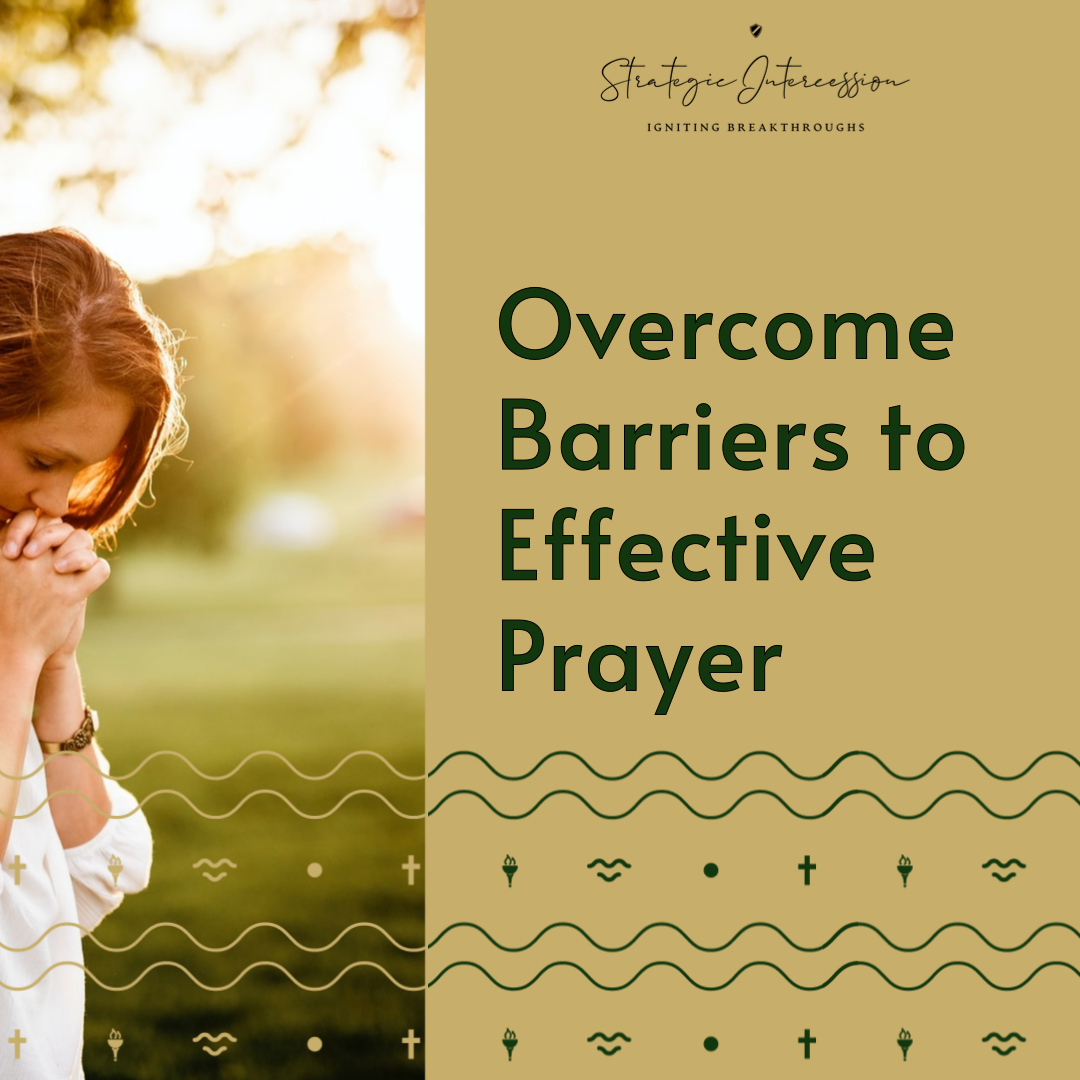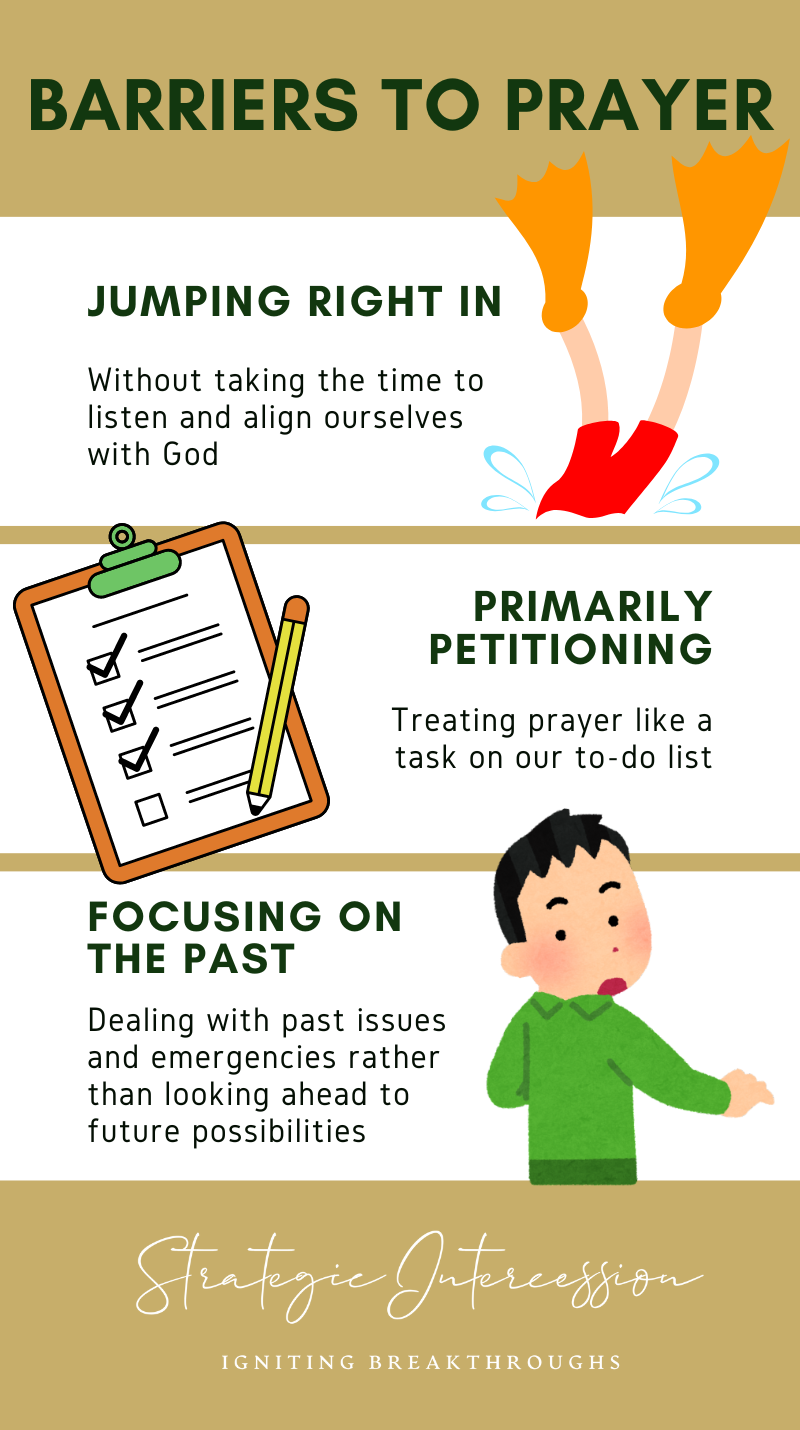Blog 3 - Overcome Barriers to Effective Prayer
Strategic intercession removes obstacles to effective prayer. Align with God’s will, pray with authority, and build a proactive prayer life that brings results.

Do you yearn to overcome barriers in your prayer life that hinder you, that you might not even recognize yet? I know I do. Simple corrections can create massive traction in the spirit. As someone who has been walking with God for many years and serving as an intercessor for leaders, I’ve learned that there are common obstacles or practices that can hinder the effectiveness of our prayers.
In my own journey, and I am sure in yours as well, I’ve discovered that prayer is so much more than just reciting a list of requests or going through the motions. It’s about a deep, intimate connection with God and partnering with Him to see His will done on Earth as it is in Heaven. But sometimes, we can get stuck in patterns or mindsets that limit the impact of our prayers.
That’s why I’m excited to explore this topic with you today. We’ll look at some of the most common obstacles that can hold us back in prayer and discuss practical strategies to break through those barriers. Whether you’re an experienced intercessor or just starting to develop your prayer life, I believe there’s always room for growth and deeper intimacy with God.
So, let’s approach this conversation with open hearts and minds, ready to learn. I’ll share some insights from my own experiences, as well as the wisdom I’ve gleaned from mentors and friends along the way. My prayer is that by the end of our time together, you’ll feel equipped and inspired to take your prayer life to the next level and see greater breakthrough in your own life and the lives of those you pray for.
Are you ready to dive in? Find a comfortable spot, and let’s get started!

Identifying Common Barriers to Effective Prayer
One of the biggest barriers I’ve noticed in my own prayer life is the tendency to just jump right in without taking the time to listen and align myself with God.
Unfortunately, with eagerness and desire to get right to prayer, this obstacle comes all too easily! Like James’ admonition, we need to be quick to listen and slow to speak. (James 1:19)
God affirmed this truth to me in respect to prayer when i was praying for an AIN client. I was taking precious time researching the client’s industry and listening to God about the specific challenges He wanted me to address in prayer. I was swept up in a wash of condemnation, with a spotlight on how much time I was not actually praying for this client. I almost took the bait when suddenly Holy Spirit intervened. I felt His presence say to me in that moment, “ You are a sharpshooter in the Spirit. Sharpshooters take more time aiming than they do pulling the trigger; every shot is effective!” Preparing our hearts, gathering needed information, and listening in advance of actually praying can equip us to pray with greater efficacy.
Sharpshooters take more time aiming than they do pulling the trigger. Every shot is effective!
It’s so easy to treat prayer like a task on our to-do list, but when we approach it with intentionality and focus, consecrating our time with God, we open ourselves up to a much deeper experience. As Jeremiah 29:13 says, “You will seek Me and find Me when you seek Me with all your heart.” If we desire to pray effectively, we take the time to pray from His presence rather than rushing straight into intercession without listening first.
Another common pitfall is relying primarily on petitioning - essentially treating prayer like a wish list of things we want God to do for us. Now, there’s nothing wrong with bringing our requests before God, but effective prayer is so much more than that. It’s about coming into agreement with Heaven, aligning our desires with God’s will, and seeking His heart and mind for our lives and leadership. In Matthew 6:33, Jesus reminds us to “seek first his Kingdom and His righteousness, and all these things will be given to you as well.” To learn more about petitioning prayer contrasted with more authoritative models of intercession, I invite you to check out Episode 2, Embracing Our Identity in God Transforms Our Prayers.
Lastly, I’ve noticed that many of us tend to focus on the past when we pray, especially in times of difficulty, often crafting for God the solution we would like to see. Most leaders have a crisis intercession hotline, friends, and family they can call in an emergency. Leaders can fall into the trap of relying on crisis prayer as their primary form of engagement with others for intercession over their needs. They only call for prayer support when things are going wrong, neglecting the ongoing potential of partnership in proactive prayer. But by establishing a prayer shield and engaging intercessors regularly, not just in times of crisis, we can develop a routine of consistent prayer that looks ahead, seeking God’s direction and equipping for prosperity for the future. This proactive stance allows us to be better prepared for challenges and more aligned with God’s ongoing work in our lives and leadership.
Leaders can fall into the trap of relying on crisis prayer as their primary form of engagement with others for intercession over their needs.
Like King Hezekiah, we can lay our impasse with impending defeat at God’s feet with a strategic emphasis on His expressed will for the future. Hezekiah prayed concerning Sennacherib, king of Assyria, “O Lord our God, I pray, save us from his hand, that all the kingdoms of the Earth may know that You are the Lord God, You alone.” ( 2 Kings 19:19 NIV) King Hezekiah prayed beyond the immediate need, “Help, so we don’t all die!” with insight into the future God wanted for His people and the surrounding nations.
Strategic intercession is all about seeking God’s plans and promises and using prayer to drive meaningful change in our lives and areas of influence. As Paul writes in Philippians 3:13-14, “…But one thing I do: Forgetting what is behind and straining toward what is ahead, I press on toward the goal to win the prize for which God has called me heavenward in Christ Jesus.” I believe Paul’s admonition is applicable to our prayer life as well.
Overcoming Misconceptions and Common Pitfalls About Prayer
A big misconception about prayer is that it’s okay to come before God while neglecting unresolved offenses and unforgiveness in our relationships. But the truth is, God is far more concerned about the state of our hearts than the bottom line of our endeavors. As believers, we have a biblical mandate to make things right with others before we come before God in prayer. In Matthew 5:23-24, Jesus says, “Therefore, if you are offering your gift at the altar and there remember that your brother or sister has something against you, leave your gift there in front of the altar. First, go and be reconciled to them; then come and offer your gift.”
The term "gift" in this context has been interpreted by various commentaries in different ways, including literal sacrifices and offerings, but also with a wider symbolic meaning to encompass all forms of worship and acts of devotion. This includes prayers, tithes, and other religious observances. The idea is that any act of worship should be preceded by reconciliation if there is a conflict with another person.
The broader principle is about prioritizing reconciliation and right relationships over religious observances, including intercession. The passage emphasizes the importance of resolving conflicts and maintaining harmony with others as a crucial aspect of true worship.
When we prioritize relational integrity, we foster healthier connections and align our prayer times more effectively with God’s heart.
When we prioritize relational integrity, we foster healthier connections and align our prayer times more effectively with God’s heart. On more than one occasion, in the midst of my prayer time, God has brought a person to mind with an unresolved conflict. We do well to set aside our needs in that moment and to prioritize what Holy Spirit is highlighting for us. Sometimes, a simple text or phone call is all that is needed to clear the air. With more complex offenses, God’s reminder is a good time to address the problem in prayer with a commitment to humbly do everything in your power to make peace when possible.
Practical Steps to Enhance Your Prayer Effectiveness
So, what can we do to overcome these barriers and enhance our prayer effectiveness? One key strategy is to establish a practice of strategic and proactive prayer. Instead of waiting for a crisis to hit before we reach out for prayer support, let’s be intentional about creating and engaging our prayer shield on a regular basis. This means shifting from reactive, crisis-oriented prayer to proactive, future-focused intercession.
We have learned another practical step is to cultivate a posture of listening and aligning with God before we start praying. Take a few moments to quiet your heart, invite the Holy Spirit to guide you, and ask God to reveal His heart and will for the situation you’re praying about. This simple practice can make a world of difference in the effectiveness of your prayers. As Psalm 46:10 reminds us, “Be still, and know that I am God.”
Putting It All Together
Well, friends, we’ve covered a lot of ground today! We’ve identified some common barriers to effective prayer, like jumping in without listening and aligning with God, relying too heavily on petitioning, and focusing on the past rather than the future. We’ve also explored some misconceptions and pitfalls, like neglecting relational integrity.
We’ve discussed practical steps we can take to enhance our prayer effectiveness, such as establishing a practice of strategic and proactive prayer and cultivating a posture of listening and alignment.
My hope is that this time together has inspired you to take a fresh look at how you pray. So, let’s put these strategies into practice, shall we?
- Start by setting aside some intentional time with God this week above and beyond your allotted prayer time to focus on listening and aligning your heart with His.
- Do you have a Prayer Shield yet? If not, we have resources to equip you with the best practices counsel you need to get one established.
- Then, reach out to your prayer shield and commit to engaging them regularly, not just in times of difficulty.
- And as you pray, boldly declare God’s promises and purposes over your life and leadership, trusting that He is moving in powerful ways.
If you’re looking for some additional resources to help you on this journey, I’d love to offer you a special gift. As a token of my appreciation for engaging with this content, I’d like to give you a free copy of my e-book, “Prayer Shield: A Guide to the Strategic Intercession You Need,” along with the companion audiobook. This resource dives even deeper into the topics we’ve discussed today and provides practical tools for establishing and maintaining a powerful prayer shield.
Thank you so much for taking the time to read this post. I truly hope it has been a blessing to you. I’d love to hear your thoughts, experiences, and any revelations you’ve had along the way. Let’s keep this conversation going in the comments below and continue to encourage one another in our prayer journeys. I’m so grateful for each and every one of you, and I can’t wait to see how God moves mightily in our lives as we seek Him together. Until next time, may His grace and peace be with you.




